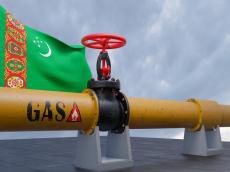|
|
TODAY.AZ / Business
Azerbaijan's gas exports to Europe: Significant milestone in region's energy landscape
08 April 2024 [13:09] - TODAY.AZ

Azerbaijan's robust performance in gas exports to Europe during the first quarter of 2024 has captured attention, signalling significant progress in the energy landscape. According to Minister of Energy Parviz Shahbazov, Azerbaijan exported a remarkable 3.2 billion cubic metres of gas to Europe from January to March this year, a figure that surpasses earlier projections and underscores the nation's growing importance as a key energy supplier to the continent.
A breakdown of the exported gas reveals the diverse destinations within Europe. Out of the total volume, 2.3 billion cubic metres were delivered to Turkiye, strengthening the longstanding energy partnership between the two countries. Additionally, 0.9 billion cubic metres were exported to Georgia, enhancing energy security in the region and fostering closer economic ties.
One of the notable achievements highlighted by Minister Shahbazov is the transportation of 1.3 billion cubic metres of gas to Turkiye through the Trans-Anatolian Gas Pipeline (TANAP). This pipeline serves as a crucial conduit for Azerbaijani gas to reach European markets efficiently, further solidifying Azerbaijan's role as a reliable energy supplier.
The initiation of Azerbaijani gas exports to Europe via the Trans Adriatic Pipeline (TAP) at the end of 2020 marked a significant milestone in the region's energy landscape. The TAP pipeline, which is part of the Southern Gas Corridor, currently boasts a transportation capacity of 12 billion cubic metres per year. Plans are underway to increase this capacity to 20 billion cubic metres by 2027, reflecting Azerbaijan's commitment to meeting the growing demand for natural gas in Europe.
The strategic importance of the TAP pipeline is underscored by its extensive network, spanning 878 kilometers across several countries. With 550 kilometres passing through Greece, 215 kilometres through Albania, 105 kilometres under the Adriatic Sea, and 8 kilometres through Italy, the TAP pipeline plays a pivotal role in enhancing energy security and diversification in the region.
Furthermore, Azerbaijan's gas transportation to Bulgaria via the Greece-Bulgaria Interconnector (IGB) represents another significant aspect of its energy strategy. Bulgargaz EAD's contract with the Shah Deniz consortium for the supply of 1 billion cubic metres of gas from the Shah Deniz 2 field underscores the nation's commitment to strengthening energy ties with European partners. The IGB pipeline, with a total length of 182 kilometres and passing through 150 kilometres of Bulgarian territory, is expected to significantly contribute to Bulgaria's energy infrastructure, with an annual transportation capacity of 3-5 billion cubic metres.
Overall, Azerbaijan's exceptional performance in gas exports to Europe during Q1 2024 demonstrates its growing significance as a key player in the European energy market. With strategic investments in infrastructure and a commitment to meeting the region's energy needs, Azerbaijan is well-positioned to play a vital role in ensuring energy security and stability in Europe for years to come.
URL: http://www.today.az/news/business/246884.html
 Print version
Print version
Connect with us. Get latest news and updates.
See Also
- 21 February 2026 [13:22]
New Sumqay?t–Lachin bus route launches to serve citizens returning to liberated areas - 21 February 2026 [10:00]
Azerbaijan reduces motor gasoline production in January - 20 February 2026 [19:00]
Gran Tierra to begin Azerbaijan onshore exploration under new SOCAR agreement - 20 February 2026 [18:36]
SOCAR launches first fully electric vehicle charging station in South Caucasus - 19 February 2026 [13:04]
Canadian energy firm to launch oil exploration in northern Azerbaijan - 18 February 2026 [13:02]
bp’s long-term investments and social projects in Azerbaijan outlined - 17 February 2026 [15:11]
Azerbaijan delivers nearly 12 bcm of gas to Türkiye in 2025, boosting annual supplies - 17 February 2026 [13:58]
Historic sell?off wipes out over $1 trillion in gold and silver market value - 17 February 2026 [12:13]
Smartphone imports to Azerbaijan fall, but spending rises as market shifts to higher-end models - 17 February 2026 [11:53]
Azerbaijan’s wheat imports surge in January compared with previous years
Most Popular
 Azerbaijan has rewritten rules of transit in South Caucasus - which way will Armenia choose?
Azerbaijan has rewritten rules of transit in South Caucasus - which way will Armenia choose?
 Caspian at risk: Azerbaijan leads call for stronger regional cooperation
Caspian at risk: Azerbaijan leads call for stronger regional cooperation
 AI leaders gather in Delhi: What Azerbaijan can learn for its national strategy
AI leaders gather in Delhi: What Azerbaijan can learn for its national strategy
 Canadian energy firm to launch oil exploration in northern Azerbaijan
Canadian energy firm to launch oil exploration in northern Azerbaijan
 Turkiye seeks active role in Gaza reconstruction as Board of Peace meets
Turkiye seeks active role in Gaza reconstruction as Board of Peace meets
 Zelensky says he cannot trust Putin, insists Ukrainian people will decide peace
Zelensky says he cannot trust Putin, insists Ukrainian people will decide peace
 Germany and France clash over fighter jet production
Germany and France clash over fighter jet production
